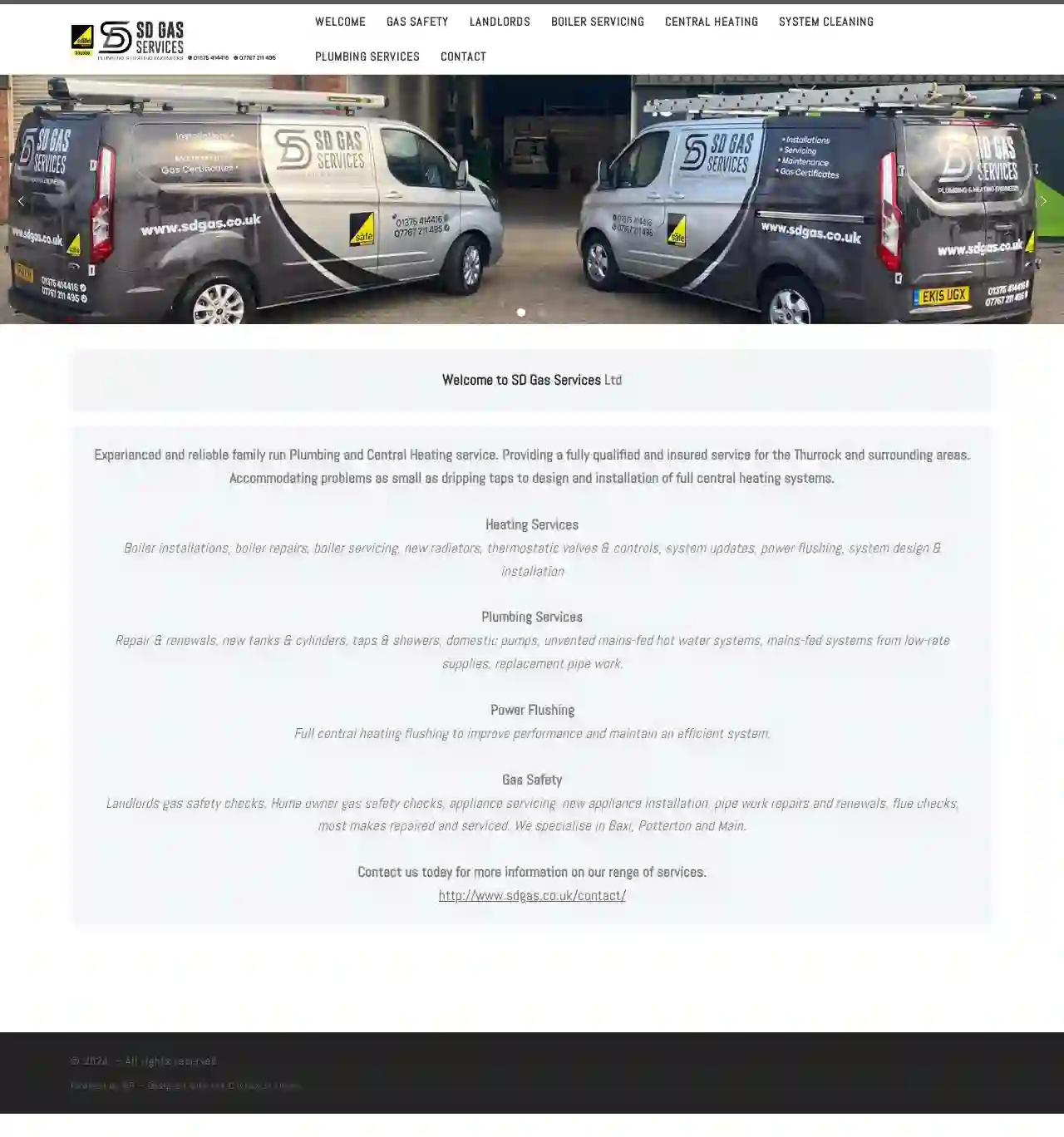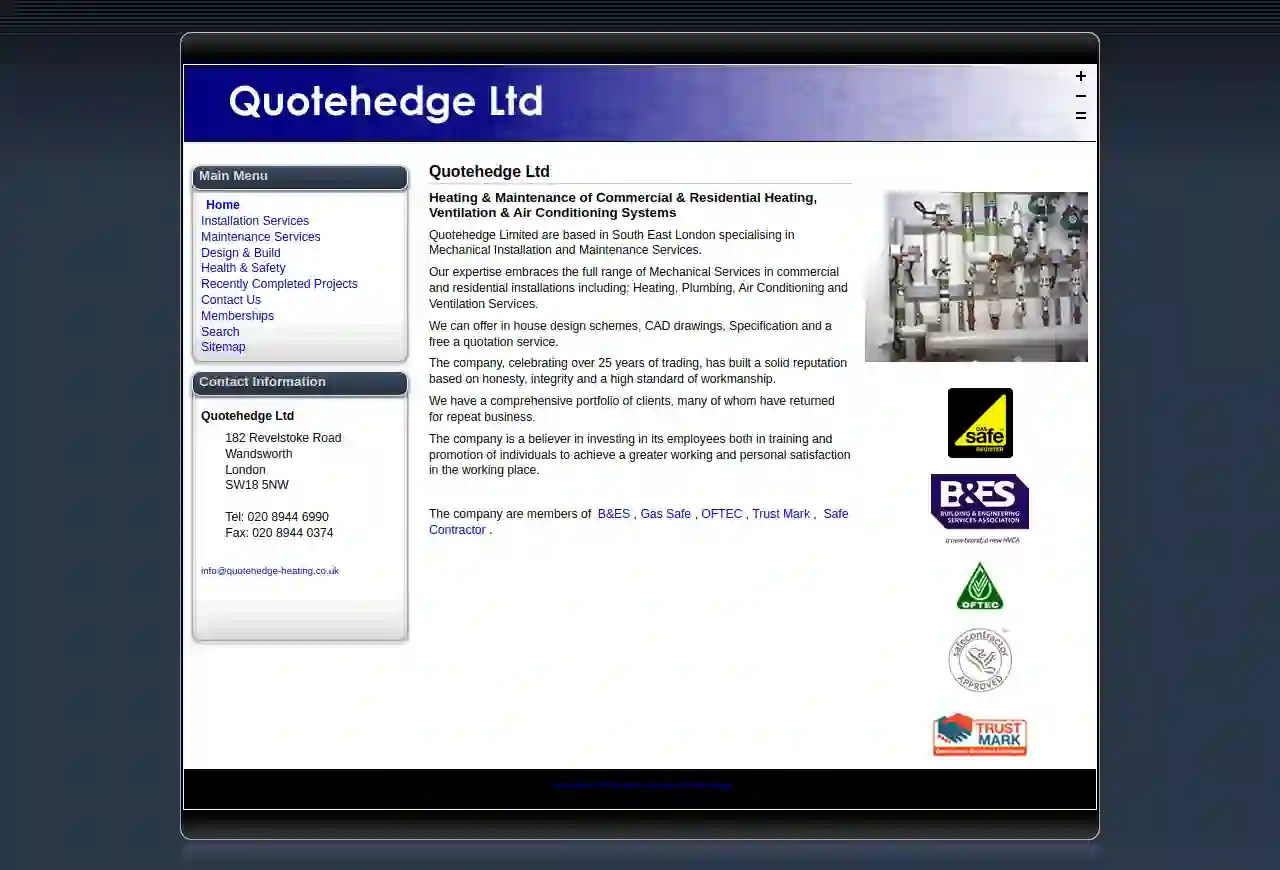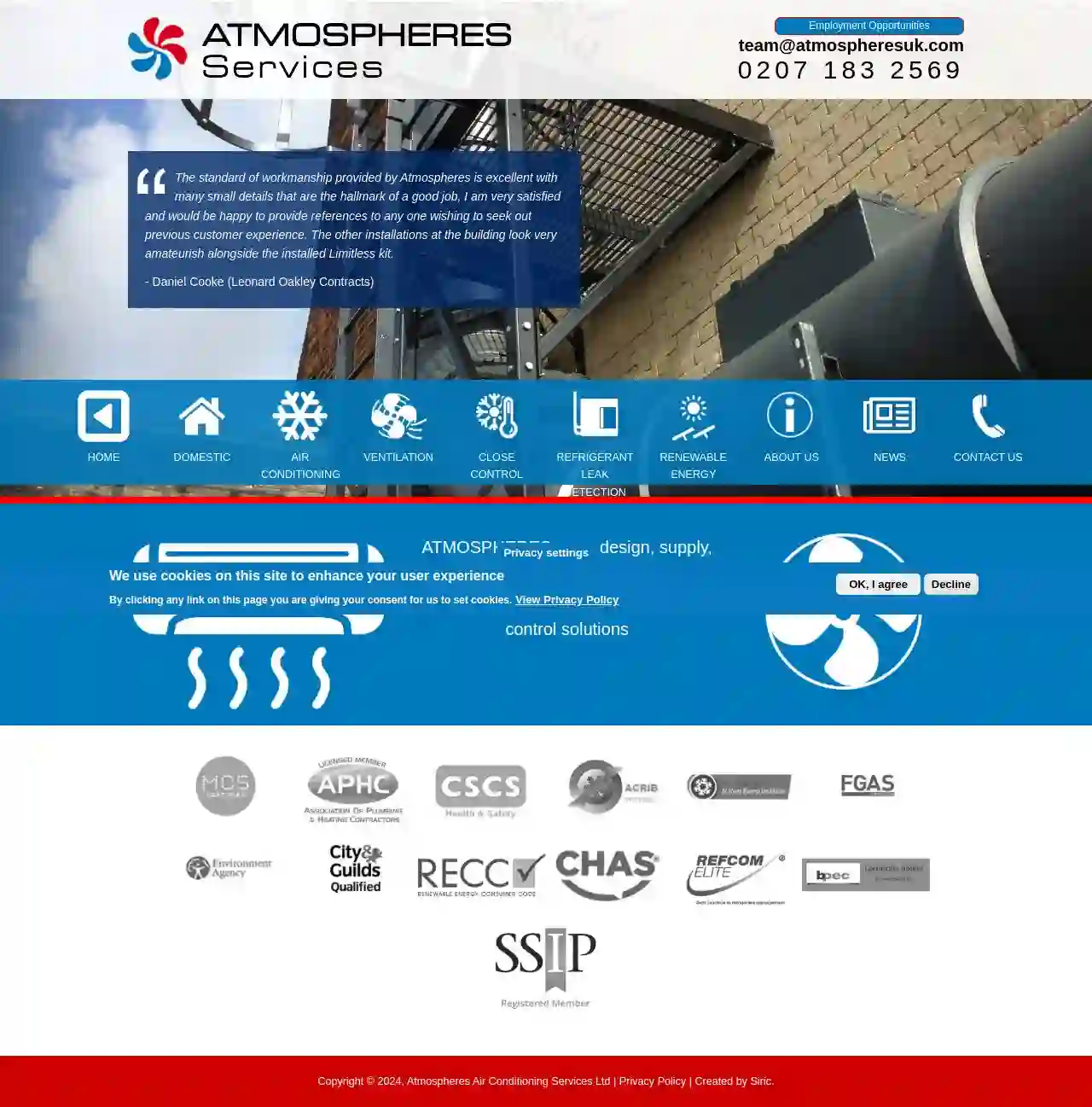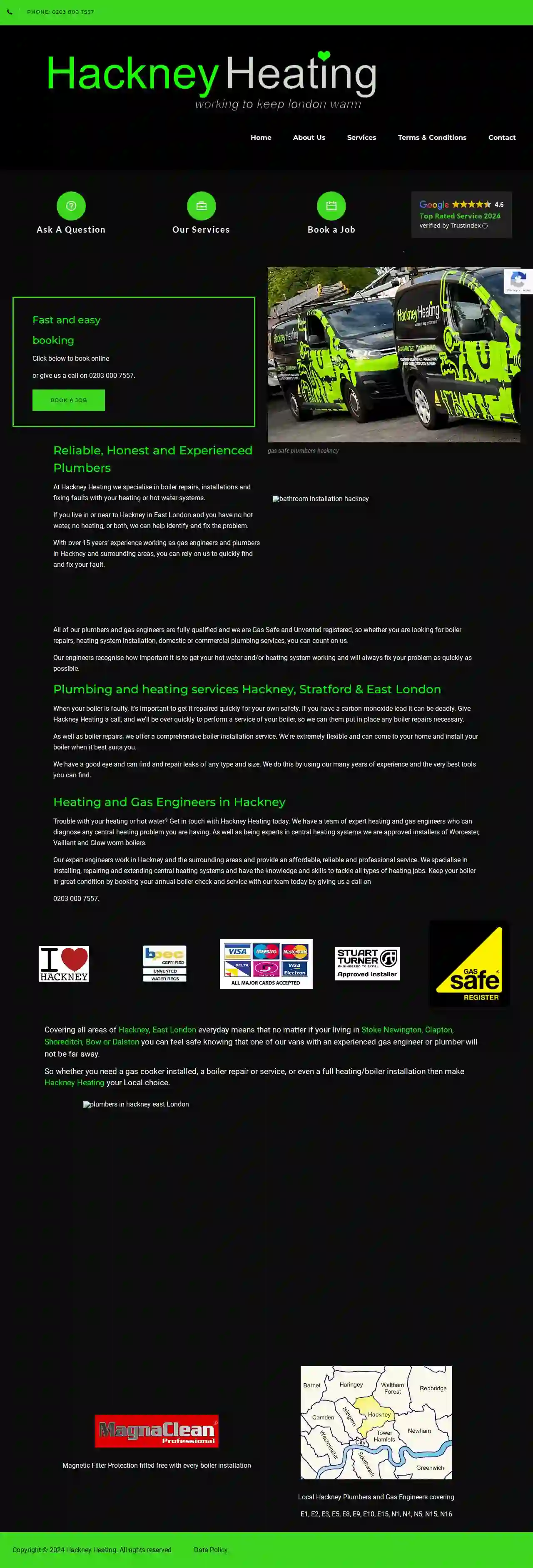AC Replacement London
Top New AC Unit in London
Get 3 FREE AC Replacement quotes for your project today! Compare profiles, reviews, accreditations, portfolio, etc... and choose the best offer.

The Taylors Group
53 reviews124 City Road, London, EC1V 2NX, GBIf you require cost effective, reliable heating and plumbing engineers then look no further. We cater to all domestic and business customer's central heating systems, gas services and plumbing requirements. We work throughout North London and the surrounding areas. We have the knowledge and expertise needed to ensure that you receive nothing but the best service. Our reputation has been developed through hard work and reliability which is why we are the area's number one choice for plumbing and gas related work. We are also listed on Plumbers Locally, for more information on heating and plumbing supplies, please click here. For more information or to obtain a free, no obligation quote, please contact us and we will be glad to help.
- Services
- Why Us?
- Accreditations
- Gallery
Get Quote
HIU SERVICE & REPAIRS - R&B LONDON HIU ENGINEERS
4.763 reviews35-37 Ludgate Hill, London, EC4M 7JN, GBWelcome to R&B London HIU Engineers Limited, your trusted partner for comprehensive HIU service and repairs. As industry leaders, we specialise in servicing, repairing and replacing HIUs. Also, in optimising the performance, efficiency, and safety of your Heating Interface Units (HIUs). Our professional team is endorsed by major UK HIU unit manufacturers, guaranteeing top-notch service that ensures uninterrupted heating for your property. HIU Servicing Solutions for Optimal Performance At R&B London HIU Engineers Limited, our expert HIU servicing is designed to enhance your communal heating’s effectiveness. With meticulous attention to detail, we fine-tune your HIU unit for peak performance and extended longevity. Our industry-endorsed approach ensures that your HIU unit system operates seamlessly, maximizing energy efficiency and providing consistent comfort. HIU Repairs: Restoring Efficiency and Reliability Count on us for swift and professional HIU repairs that restore your heating and hot water system’s efficiency and reliability. Our experienced team promptly diagnoses and addresses issues to ensure uninterrupted heating and hot water. As recommended by major UK HIU manufacturers, our reliable repairs guarantee a seamless HIU experience, delivering peace of mind and consistent warmth. Competitive - Experienced - Fast Response - Well Equiped - 92% First Time Fix Rate* London's Leading HIU Specialists
- Services
- Why Us?
- Gallery
Get Quote
J C Watson Mechanical
4.615 reviewsLondon, GBJC Watson is a leading provider of commercial air conditioning, refrigeration, ventilation, and mechanical engineering services. With over 40 years of experience, we have built a reputation for delivering exceptional solutions to businesses across a wide range of industries. Our team of highly trained engineers and technicians is committed to providing reliable, efficient, and cost-effective services that meet the unique needs of each client. We are proud to be approved contractors for NHS Trusts, local authorities, and businesses, and we hold a number of industry accreditations, including ISO 9001, 14001, and 45001. Our commitment to safety is paramount, and we conduct on-site risk assessments, staff safety inductions, and training to ensure the well-being of our employees and clients. At JC Watson, we understand that your business relies on efficient and reliable systems. That's why we offer a comprehensive range of services, including installation, service, and maintenance, to keep your systems running smoothly. Whether you need air conditioning, refrigeration, ventilation, or mechanical engineering solutions, our team has the expertise and experience to deliver.
- Services
- Why Us?
- Accreditations
- Gallery
Get Quote
Electric Heating installations London - AC1 Electrical Services LTD
1London, GBAt AC1 Electrical Services LTD, we've dedicated ourselves to fulfilling this essential need for both domestic and commercial customers. Seamlessly integrating advanced electric heating technologies into the cosy households, bustling offices, and dynamic commercial spaces in London, we are more than just a service provider; we are partners in ensuring year-round comfort. Our deep-rooted understanding of unique climatic demands, coupled with our commitment to premium service, ensures that every room we touch transforms into a haven of warmth and comfort.
- Services
- Why Us?
- Gallery
Get Quote
Claremore Mechanical Services Ltd
52 reviews31 Grangewood Street, London, E6 1HB, GBClaremore, leading the way in care, craftsmanship and fairer pricing in the building services sector. As a full-service company we have departments for designing, installing and maintaining any and all of your heating, air conditioning, plumbing, ventilation, drainage, lighting and electrical services. And, because of our passion for our profession and the vast knowledge we have of the latest in regulations, technologies and strategies, we can help you devise and implement a multitude of cost-saving and sustainability strategies for your building.
- Services
- Why Us?
- Testimonials
- Gallery
Get Quote
S D Gas Services
1The Business Centre, Grays, Unit 10, RM19 1AA, GBWelcome to SD Gas Services Ltd, an experienced and reliable family-run Plumbing and Central Heating service. We provide a fully qualified and insured service for the Thurrock and surrounding areas. We accommodate problems as small as dripping taps to the design and installation of full central heating systems. Heating Services Boiler installations Boiler repairs li> Boiler servicing New radiators Thermostatic valves & controls System updates Power flushing System design & installation Plumbing Services Repair & renewals New tanks & cylinders Taps & showers Domestic pumps Unvented mains-fed hot water systems Mains-fed systems from low-rate supplies Replacement pipe work Power Flushing Full central heating flushing to improve performance and maintain an efficient system. Gas Safety Landlords gas safety checks Home owner gas safety checks Appliance servicing New appliance installation Pipe work repairs and renewals Flue checks Most makes repaired and serviced. We specialise in Baxi, Potterton and Main. Contact us today for more information on our range of services. http://www.sdgas.co.uk/contact/ © 2024 – All rights reserved Powered by WP – Designed with the Customizr theme
- Services
- Why Us?
- Gallery
Get Quote
AMVA Ltd
52 reviewsInternational House, 10 Beaufort Court, Admirals Way, London, E14 9XL, GBAmva is a UK based and owned company that is passionate about bringing your heating and hot water systems into the future. Amva is here to offer you the best solutions for your heating problems. Offering you the most economical way of heating your home and supplying you with hot water when you need it. With years of research and the latest technology we can save you money and create a smaller footprint for future generations.
- Services
- Why Us?
- Gallery
Get Quote
Quotehedge
4.526 reviews182 Revelstoke Road, Wandsworth, SW18 5NW, GBQuotehedge Ltd is a company based in South East London that specializes in Mechanical Installation and Maintenance Services. They have over 25 years of experience and offer a range of services including Heating, Plumbing, Air Conditioning and Ventilation. Quotehedge Ltd prides itself on honesty, integrity and a high standard of workmanship. They have a comprehensive portfolio of clients, many of whom have returned for repeat business. The company invests in its employees through training and promotion to achieve greater working and personal satisfaction. Quotehedge Ltd is a member of B&ES, Gas Safe, OFTEC, Trust Mark and Safe Contractor.
- Services
- Why Us?
- Accreditations
- Gallery
Get Quote
Atmospheres Services
1London, GBATMOSPHERES are a design, supply, installation & maintenance services provider of temperature & ventilation control solutions.
- Services
- Why Us?
- Testimonials
- Gallery
Get Quote
Hackney Heating
4.6188 reviewsHackney, E1, GBAt Hackney Heating we specialise in boiler repairs, installations and fixing faults with your heating or hot water systems. If you live in or near to Hackney in East London and you have no hot water, no heating, or both, we can help identify and fix the problem. With over 15 years’ experience working as gas engineers and plumbers in Hackney and surrounding areas, you can rely on us to quickly find and fix your fault. All of our plumbers and gas engineers are fully qualified and we are Gas Safe and Unvented registered, so whether you are looking for boiler repairs, heating system installation, domestic or commercial plumbing services, you can count on us. Our engineers recognise how important it is to get your hot water and/or heating system working and will always fix your problem as quickly as possible. When your boiler is faulty, it's important to get it repaired quickly for your own safety. If you have a carbon monoxide lead it can be deadly. Give Hackney Heating a call, and we'll be over quickly to perform a service of your boiler, so we can them put in place any boiler repairs necessary. As well as boiler repairs, we offer a comprehensive boiler installation service. We're extremely flexible and can come to your home and install your boiler when it best suits you. We have a good eye and can find and repair leaks of any type and size. We do this by using our many years of experience and the very best tools you can find. Heating and Gas Engineers in Hackney Trouble with your heating or hot water? Get in touch with Hackney Heating today. We have a team of expert heating and gas engineers who can diagnose any central heating problem you are having. As well as being experts in central heating systems we are approved installers of Worcester, Vaillant and Glow worm boilers. Our expert engineers work in Hackney and the surrounding areas and provide an affordable, reliable and professional service. We specialise in installing, repairing and extending central heating systems and have the knowledge and skills to tackle all types of heating jobs. Keep your boiler in great condition by booking your annual boiler check and service with our team today by giving us a call on 0203 000 7557. Covering all areas of Hackney, East London everyday means that no matter if your living in Stoke Newington, Clapton, Shoreditch, Bow or Dalston you can feel safe knowing that one of our vans with an experienced gas engineer or plumber will not be far away. So whether you need a gas cooker installed, a boiler repair or service, or even a full heating/boiler installation then make Hackney Heating your Local choice. Magnetic Filter Protection fitted free with every boiler installation Local Hackney Plumbers and Gas Engineers covering E1, E2, E3, E5, E8, E9, E10, E15, N1, N4, N5, N15, N16
- Services
- Why Us?
- Accreditations
- Gallery
Get Quote
Over 1,991+ HVAC Companies on our directory
Our HVAC pros operate in London and beyond!
HVACCompaniesHub has curated and vetted the Best HVAC Companies near London. Find the most trustworthy business today.
Frequently Asked Questions about AC Replacement
- Clear the Area: Remove any obstacles around the indoor and outdoor units, such as furniture, plants, or debris.
- Protect Your Belongings: Cover furniture and floors near the installation area to protect them from dust or debris.
- Provide Access: Make sure the installers have unobstructed access to your home's electrical panel, attic, or crawl space.
- Trim Plants: Trim any plants or bushes near the outdoor unit to provide adequate airflow.
- Communicate: Discuss the installation process with your contractor and confirm timing and other arrangements.
- Turn off the power: Before cleaning, disconnect the power to your AC unit at the circuit breaker.
- Clean the outdoor unit: Clear away any debris, such as leaves, grass, and dirt, from around the unit. Use a garden hose to rinse the condenser coils and fins.
- Clean the indoor unit: Remove the access panel to the air handler and check the filter. Gently vacuum the evaporator coil fins and drip pan.
How do I prepare for an AC replacement installation?
What is a heat pump, and how does it work?
How do I clean my AC unit?
How does HVAC zoning work?
How do I prepare for an AC replacement installation?
- Clear the Area: Ensure the installers have easy access to your existing unit and the installation location for the new one.
- Protect Your Belongings: Cover furniture and floors near the installation area to protect them from dust or debris.
- Provide Access: Make sure the installers have clear access to all areas where they'll be working.
- Trim Plants: Trim any plants or bushes near the outdoor unit that might restrict access.
- Communicate: Discuss the installation process with your contractor and confirm timing and other arrangements.
What is a heat pump, and how does it work?
How do I clean my AC unit?
- Turn off the power: Before cleaning, disconnect the power to your AC unit at the circuit breaker.
- Clean the outdoor unit: Remove obstructions and debris from the exterior unit. Use a garden hose to rinse the condenser coils and fins.
- Clean the indoor unit: Remove the access panel to the air handler and clean or replace the air filter. Gently vacuum the evaporator coil fins and drip pan.